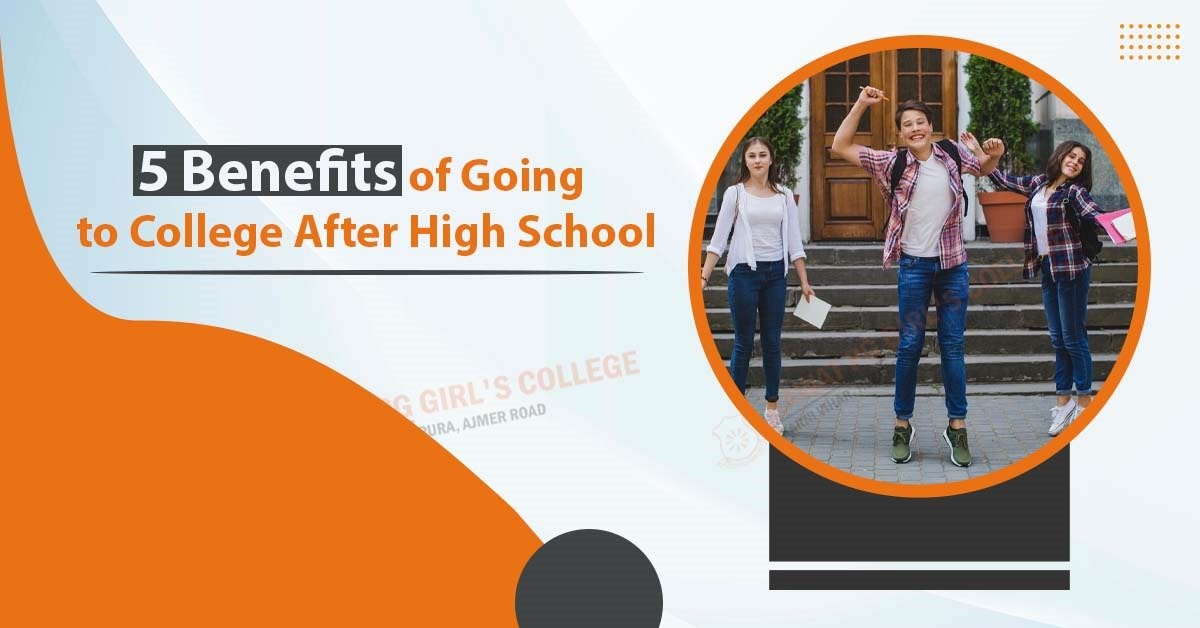5 Benefits of Going to College After High School
Choosing whether or not to pursue higher education immediately after completing high school is a significant decision that many young adults face. While some may opt to enter the workforce or pursue other paths, attending college after high school offers many benefits that can shape one's future in profound ways.
The advantages of obtaining a college degree are numerous and far-reaching, from academic and personal growth to increased career opportunities and earning potential. In this essay, we will delve into five key benefits of going to college after high school, exploring each benefit in detail to understand the value it brings to individuals and society.
Benefits of Going to College after High School:
Benefit 1: Academic Enrichment
One of the primary benefits of attending college after high school is the opportunity for academic enrichment. The college provides a structured environment where students can deepen their knowledge and expertise in specific fields of study.
Through rigorous coursework, engaging lectures, and hands-on learning experiences, students are challenged to think critically, solve complex problems, and expand their intellectual horizons.
Moreover, the college offers access to resources such as libraries, laboratories, and research facilities, allowing students to explore new ideas, conduct experiments, and contribute to the advancement of knowledge in their chosen disciplines. The academic rigour of college fosters a culture of intellectual curiosity and scholarly pursuit, nurturing the development of lifelong learners who are equipped to thrive in an ever-evolving world.
Benefit 2: Personal Growth
In addition to academic enrichment, attending college after high school fosters significant personal growth and development. College is a transformative experience that exposes students to diverse perspectives, cultures, and ways of thinking.
Living on a college campus, interacting with peers from various backgrounds, and engaging in extracurricular activities help students broaden their social horizons, enhance their communication skills, and build meaningful relationships.
Moreover, the college encourages self-discovery and self-expression, empowering students to explore their interests, passions, and values. From participating in student organizations to studying abroad, the college offers a wealth of opportunities for personal exploration and growth, helping students develop into well-rounded individuals with a strong sense of identity and purpose.
Benefit 3: Career Preparation
Another significant benefit of attending college after high school is the preparation it provides for future career success. The college equips students with the knowledge, skills, and credentials necessary to pursue their desired professions and excel in the workforce.
Through specialized coursework, internships, and co-op programs, students gain practical experience and industry-specific expertise that enhances their employability and marketability. Moreover, college fosters essential skills such as critical thinking, problem-solving, teamwork, and communication, which are highly valued by employers across diverse fields.
Additionally, many colleges offer career services and networking opportunities to help students explore career options, connect with potential employers, and navigate the job market effectively. By investing in their education, students lay the foundation for long-term career growth and advancement, positioning themselves for fulfilling and rewarding professional opportunities.
Also read: What is hybrid learning in education
Benefit 4: Increased Earning Potential
One of the most tangible benefits of obtaining a college degree is the potential for increased earning power. Statistics consistently show that individuals with higher levels of education tend to earn higher salaries and enjoy greater financial stability over their lifetimes.
Furthermore, many high-paying professions, such as engineering, medicine, and law, require advanced degrees or specialized training that can only be obtained through college education.
By earning a college degree, individuals not only open doors to lucrative career opportunities but also position themselves for higher earning potential and improved economic mobility. The financial investment in a college education often yields substantial returns in the form of increased lifetime earnings and improved socioeconomic status.
Benefit 5: Expanded Opportunities
Finally, attending college after high school opens up a world of opportunities and possibilities for individuals to explore and pursue their aspirations. Whether it's pursuing advanced degrees, launching entrepreneurial ventures, or making a difference in their communities, college graduates are equipped with the knowledge, skills, and confidence to pursue their dreams and make meaningful contributions to society.
Moreover, the college provides access to a vast network of alumni, mentors, and resources that can offer guidance, support, and opportunities for personal and professional growth. By embracing the opportunities afforded by college education, individuals can unlock their full potential and chart a course toward a brighter and more fulfilling future.
Conclusion:
The decision to pursue college after high school presents a myriad of advantages that transcend mere academic achievement. From the enrichment of knowledge and personal growth to the honing of skills essential for career success and the potential for increased earnings, the benefits of earning a college degree are both wide-ranging and deeply impactful.
By committing to higher education, individuals not only broaden their intellectual horizons but also position themselves to seize a wealth of opportunities. As our world becomes increasingly intricate and competitive, a college education serves as a vital catalyst for navigating the complexities of today's global landscape. It's not just about acquiring knowledge; it's about embracing a mindset of lifelong learning and adaptability, essential qualities for thriving in an ever-evolving society.
Ultimately, investing in a college education isn't merely an investment in oneself; it's an investment in the collective future. By empowering individuals with the tools and resources needed to succeed, higher education plays a pivotal role in shaping a prosperous and equitable society for generations to come. Thus, the value of attending college after high school cannot be overstated—it is a cornerstone of progress and prosperity for both individuals and society as a whole.



